Fellowships
Nieman Fellowships at Harvard
The Nieman Foundation offers several types of fellowships at Harvard University each year. Academic-year Nieman Fellowships are offered to journalists who spend two semesters studying on campus; the Abrams Nieman Fellowships for Local Investigative Journalism offer reporters and editors from underserved areas the benefits of an academic year fellowship, along with funding for fieldwork to develop investigative projects at home after time at Harvard; and the Knight Visiting Nieman Fellowships are offered for up to 12 weeks to journalists and others seeking solutions to problems and challenges facing journalism.
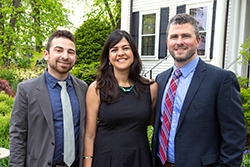
The three inaugural Abrams Nieman Fellows for Local Investigative Journalism: (from left) Benny Becker, Laura N. Pérez Sánchez and Nathan Payne
The Nieman class of 2019 included the first Nieman Fellow from Myanmar and the inaugural Abrams Nieman Fellows for Local Investigative Journalism and our first Robert L. Long Nieman Fellow from Turkey. The 27 fellows included reporters, correspondents, editors, photographers, filmmakers, television news anchors and a radio producer along with other journalists from around the world who specialize in data investigations, digital development, social media, virtual reality and new forms of storytelling.
The class of 2020 included our first-ever fellows from Syria and Niger as well as a mix of journalists from legacy operations such as The Wall Street Journal, NPR and The Boston Globe’s Spotlight team and fellows from digital newsrooms including Quartz and FiveThirtyEight, and the executive director of news at Canada’s Aboriginal Peoples Television Network. The second group of Abrams Nieman Fellows for Local Investigative Journalism joined us from Wyoming, Michigan and Georgia, and a reporter from Montana was selected for the Harry M. Davis Nieman Fellowship in Science Journalism. We also accepted our second Robert L. Long Nieman Fellow from Turkey.
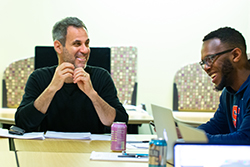
Writing instructor Steve Almond, left, and 2019 Nieman Fellow Jonathan Jackson
Throughout the academic year, fellows take classes at Harvard and MIT, participate in weekly events at Nieman, including seminars, shop talks, master classes—such as an intensive one-day course in negotiation taught by Brian Mandell, director of the Harvard Kennedy School Negotiation Project —and occasional workshops that provide training around a specific topic. The fellows take turns answering the question “Why do you do what you do?” during weekly Soundings. And they take advantage of classes designed exclusively for them. Author Steve Almond taught narrative nonfiction writing; novelist Anne Bernays taught fiction writing; and public speaking was led by Holly Weeks, adjunct lecturer in public policy at Harvard Kennedy School.
The fellows get to know local alumni, hear from publishers about the book industry, share their writing projects during an end-of-semester reading night and organize “DIYs” for their classmates, either sharing their own expertise or inviting outside guests to talk about their work in journalism. The 2019 fellows also gave presentations about a number of the innovative projects they manage in their newsrooms during a visit to Google’s Cambridge headquarters.
Engagement on campus
The Nieman class of 2019
Samantha Appleton started the year with “La Meta,” a photo exhibit of her work at the Harvard Ed Portal featuring portraits of the migrant laborers who plant, tend and harvest our food. Appleton is known for her work covering conflicts around the world and serving as an official White House photographer for President Barack Obama. She also taught photojournalism at Harvard Extension School.
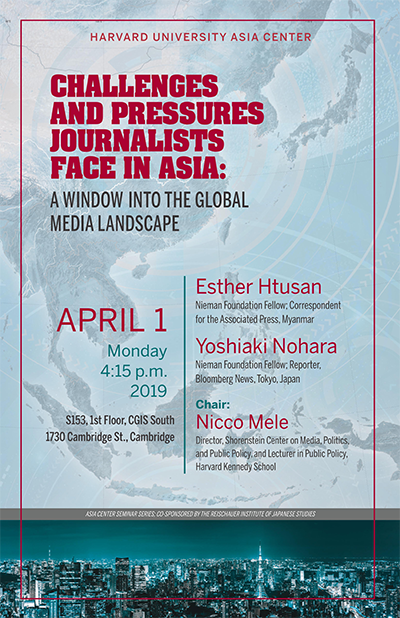 Esther Htusan, an AP correspondent from Myanmar, and Yoshiaki Nohara, an economics reporter for Bloomberg News in Tokyo, spoke at the Harvard Asia Center event “Challenges and Pressures Journalists Face in Asia: A Window into the Global Media Landscape.” The talk was moderated by Nieman Board member Nicco Mele.
Esther Htusan, an AP correspondent from Myanmar, and Yoshiaki Nohara, an economics reporter for Bloomberg News in Tokyo, spoke at the Harvard Asia Center event “Challenges and Pressures Journalists Face in Asia: A Window into the Global Media Landscape.” The talk was moderated by Nieman Board member Nicco Mele.
AfşinYurdakul, the first Robert L. Long Nieman Fellow, and a news anchor and correspondent for Habertürk News Network in Turkey, spoke at the Center for Middle Eastern Studies event “Covering the Syrian Refugee Crisis: Analyzing from a Turkish Perspective.” During her Nieman year, Yurdakul studied the impact of the Syrian refugee crisis on Turkey and other host nations, focusing on what they can do to support the economic and social integration of refugees. She also moderated a panel on migration during the Harvard European Conference.
Tanya Ballard Brown, a digital editor for NPR.org, spoke about “What Procrastination Taught me About Improvisation and Narrative Storytelling” during the Power of Narrative conference at Boston University.
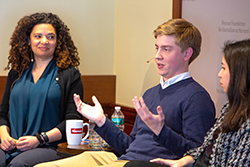
2019 Nieman Fellow Anica Butler moderates a panel at the 2019 Georges Conference
A number of fellows taught sessions during the 2019 Georges Conference on College Journalism: Francesca Panetta, creative director at MIT’s Center for Virtuality and former editor of virtual reality at The Guardian, and Abrams Nieman Fellow Benny Becker, a public radio reporter for the Ohio Valley Resource and WMMT/Appalshop, offered an introduction to podcasting. Steve Myers, a national enterprise editor for investigations at USA Today and former editor of The Lens, and Mary Ellen Klas, capital bureau chief for The Miami Herald in Tallahassee, Florida, discussed finding stories in public records. Nathan Payne, executive editor of Michigan’s Traverse City Record-Eagle, Gabriella Schwarz, news program lead at Facebook and former managing editor and head of news at Flipboard, and Kaeti Hinck, director of visual news at CNN Digital and former editor at The Washington Post in charge of a team of visual journalists and developers, led a session on “Finding Your First Gig: How to Approach the Job Search, Craft a Media Resume and Cover Letter and Get Started in Journalism.” Anica Butler, Ideas editor at The Boston Globe and former deputy editor in the Globe’s news department, moderated the plenary session “A Career in Journalism/Media.” And Nieman Lab staff writer Christine Schmidt moderated the student lightning round “Hear from Your Peers.”
The Nieman Class of 2020
Carrie Johnson, the national justice correspondent for NPR, moderated a talk with New York Times journalists and authors of “She Said: Breaking the Sexual Harassment Story That Helped Ignite a Movement” Jodi Kantor and Megan Twohey, along with actress and political activist Ashley Judd. Johnson also addressed the “Government Lawyer” class at Harvard Law School.
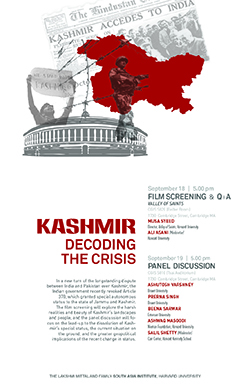 Ashwaq Masoodi, most recently a national writer for the Indian daily Mint, participated in the current events seminar “Crisis in Kashmir” sponsored by the Lakshmi Mittal and Family South Asia Institute at Harvard University. She also was a panelist in the “Human Rights in Kashmir & Beyond” discussion hosted by the Coalition for a Democratic India and the Alliance for a Secular & Democratic South Asia at MIT.
Ashwaq Masoodi, most recently a national writer for the Indian daily Mint, participated in the current events seminar “Crisis in Kashmir” sponsored by the Lakshmi Mittal and Family South Asia Institute at Harvard University. She also was a panelist in the “Human Rights in Kashmir & Beyond” discussion hosted by the Coalition for a Democratic India and the Alliance for a Secular & Democratic South Asia at MIT.
Chastity Pratt, most recently the urban affairs reporter for Bridge Magazine, was a guest lecture on multimedia storytelling at MIT’s Open Documentary Lab.
Karyn Pugliese, an assistant professor of journalism at Ryerson University and, until recently, executive director of news and current affairs at the Aboriginal Peoples Television Network in Winnipeg, Canada, was invited to participate in Canada’s Federal Election Roundtable sponsored by the Weatherhead Center for International Affairs. She also spoke on a reconciliation panel.
Lucy Hornby, most recently deputy bureau chief in Beijing for the Financial Times, spoke at Harvard’s Fairbank Center For Chinese Studies, discussing “China’s Secret World of Shadow Banking.” Hornby also delivered the talk “China’s Belt and Road Initiative—A New Colonialism?” at Boston University’s Global Development Policy Center.
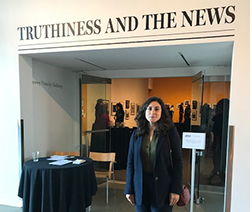
2020 Nieman Fellow Gülsin Harman, was a featured speaker at the “Art and Journalism in the Era of Post-Truth Politics” symposium
Gülsin Harman, a freelance reporter with The New York Times Istanbul Bureau and the 2020 Robert L. Long Nieman Fellow, was a featured speaker at the “Art and Journalism in the Era of Post-Truth Politics” symposium held at the deCordova Sculpture Park and Museum held in conjunction with the Truthiness and the News exhibit.
Nour Malas, a Wall Street Journal reporter, moderated a talk explaining protests in Lebanon at Harvard Kennedy School with two protest leaders who Skyped in from Beirut. She also moderated a panel on retraining the Arab workforce for high-tech industries at an inaugural Arab business conference at Harvard Business School.
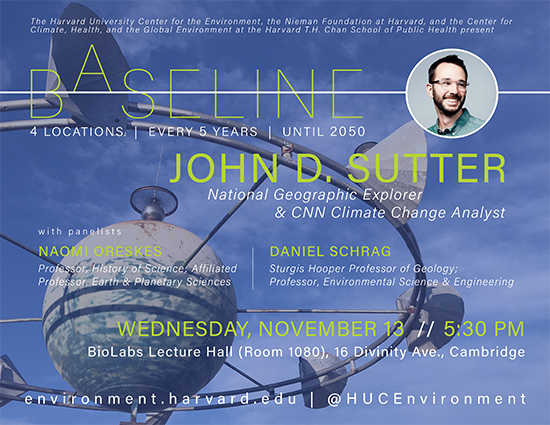 2019 Visiting Nieman Fellow John Sutter, a journalist with National Geographic Explorer and a CNN climate analyst, spoke on campus about his BASELINE documentary film project and was a panelist at Nieman’s Covering Climate Change conference in November, discussing how to best show and tell climate stories.
2019 Visiting Nieman Fellow John Sutter, a journalist with National Geographic Explorer and a CNN climate analyst, spoke on campus about his BASELINE documentary film project and was a panelist at Nieman’s Covering Climate Change conference in November, discussing how to best show and tell climate stories.
Nieman fellows Selymar Colón, most recently vice president and editor-in-chief of digital news at Univision, Natalia Guerrero,a multimedia journalist for the BBC, and Ana Campoy, a senior reporter for Quartz, spoke about Latinx journalism in the United States.
Hannane Ferdjani, a Nieman-Berkman Klein Fellow, was the keynote speaker at a Harvard African Law Association (HALA) benefit dinner. The event honored Girls Empowerment Sierra Leone (GESL), an organization in Sierra Leone that nurtures and enhances the leadership skills of young girls to become effective advocates and social change agents in their communities.
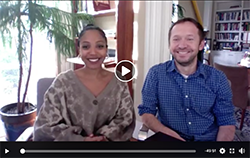 Ferdjani and Nieman classmate Andras Petho, co-founder of Direkt36, an investigative journalism center in Hungary, hosted a Facebook Live chat to help prospective applicants understand how to apply for a Nieman Fellowship and what to expect from life on campus.
Ferdjani and Nieman classmate Andras Petho, co-founder of Direkt36, an investigative journalism center in Hungary, hosted a Facebook Live chat to help prospective applicants understand how to apply for a Nieman Fellowship and what to expect from life on campus.
Fellows’ Contributions to Nieman Reports
Soundings
Each week throughout the academic year, Nieman Fellows take turns explaining why they do what they do as journalists. Some highlights from 2019:
Knight Visiting Nieman Fellows
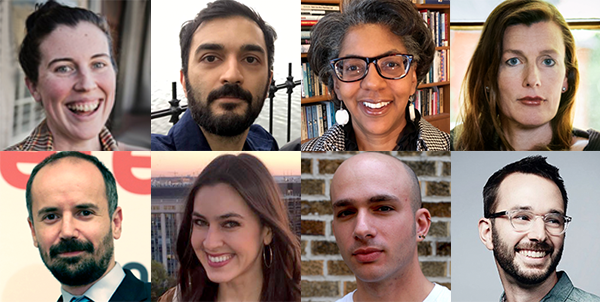
2019 Knight Visiting Nieman Fellows, clockwise from left: Sarah Baird, Kabir Chibber, Karima Haynes, Heather Hendershot, Emre Kizilkaya, Taylor Lorenz, P.E. Moskowitz and John D. Sutter
The 2019 Knight Visiting Nieman Fellows worked on projects ranging from creating a platform for independent journalism in Turkey and helping high school journalists address cyberbullying to exploring how journalists can tell multigenerational stories about climate change.
Sarah Baird, a Kentucky-based freelance journalist and founder of Shoeleather, a directory of local reporters, explored how to build community and resource-sharing among independent journalists as a means of combating the negative impacts—both local and national—of parachute journalism across the United States. Her goal was to create a toolkit to serve the community of freelance journalists working outside of traditional media centers.
@scbaird
Kabir Chibber, most recently the business editor at Quartz, researched the sustainability of specialized email subscriptions as a driving force for readership and revenue in journalism.
Karima Haynes, assistant professor at Bowie State University in Maryland, worked on developing a curriculum for high school journalists focused on cyberbullying as a media literacy issue. Her goal was to create a guidebook for these journalists and their teachers and faculty advisers to identify and address cyberbullying on student-run news sites.
@Karima_Haynes
Heather Hendershot, a film and media professor at MIT, examined TV coverage of the 1968 Chicago Democratic National Convention, focusing on Mayor Daley’s use of media during and after the convention. She explored how the notion of journalistic neutrality was challenged at the time and what lessons can be learned to better understand the contemporary news landscape and the current presidential administration’s inflammatory, divisive accusations of “fake news.”
@ProfHendershot
Emre Kizilkaya, executive editor for Hürriyet Daily News in Istanbul, developed an online platform for sustainable independent journalism in Turkey designed to connect student journalists with senior reporters to collaborate on stories that will be selected and funded by local communities.
@ekizilkaya
Taylor Lorenz, a technology reporter for The New York Times, formerly a staff writer at The Atlantic, studied how members of Generation Z create, consume and distribute news information on Instagram.
@taylorlorenz
P.E. Moskowitz, co-founder of Study Hall, a media newsletter and online support platform for media workers, researched labor relations in the media and how digital communities can grow sustainably.
@_pem_pem
John D. Sutter, a senior investigative reporter for CNN, explored how journalists can better tell multigenerational stories, particularly those involving climate change. His goal is to use this research at the intersection of ecology, anthropology and technology to launch “Baseline,” an online documentary project that aims to revisit climate hotspots over coming generations and compress those timelines into meaningful, human stories.
@jdsutter
